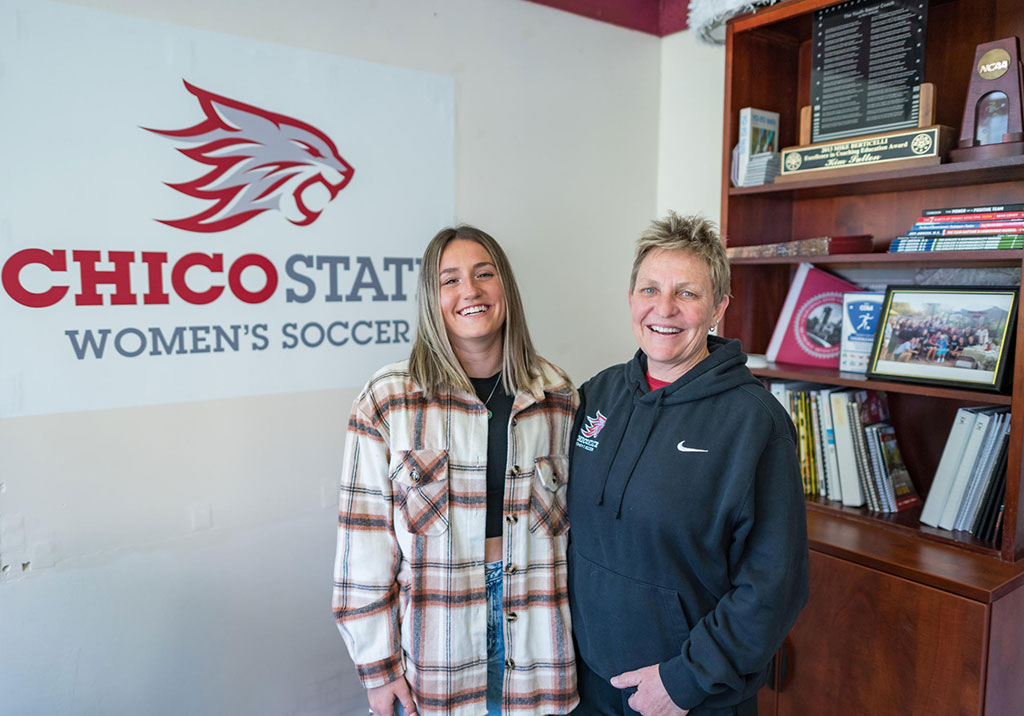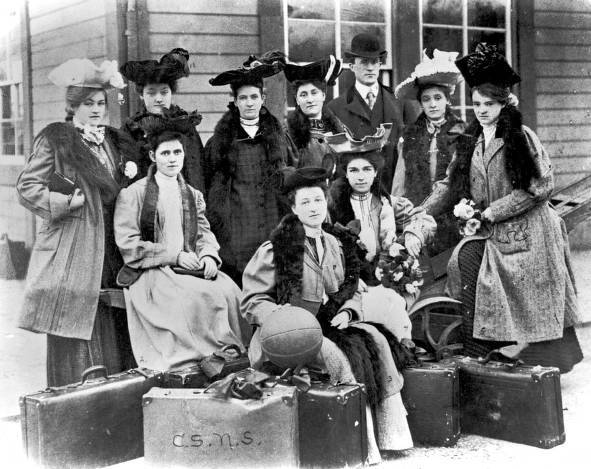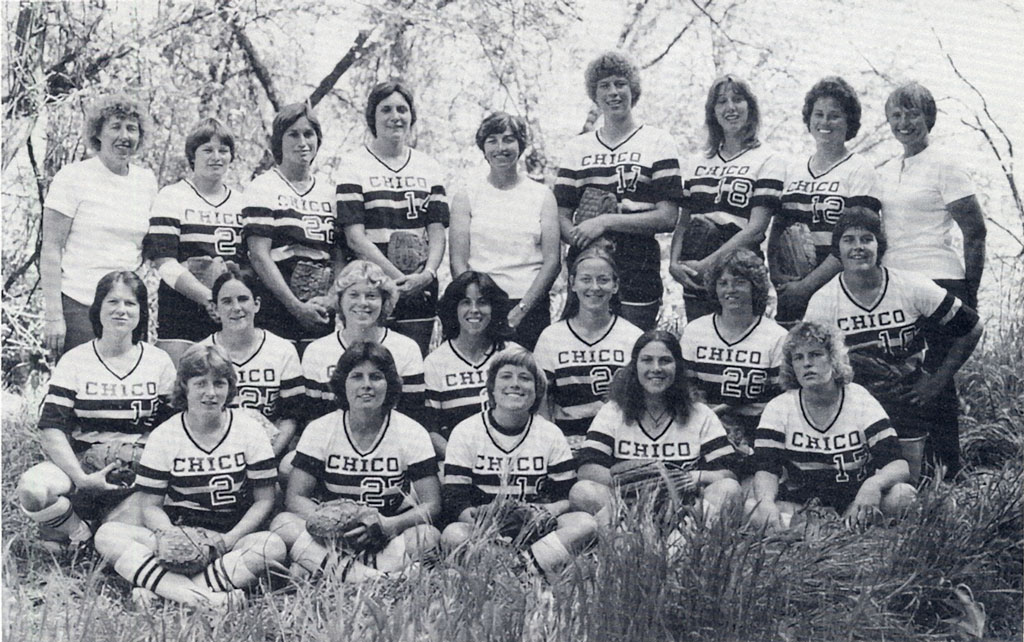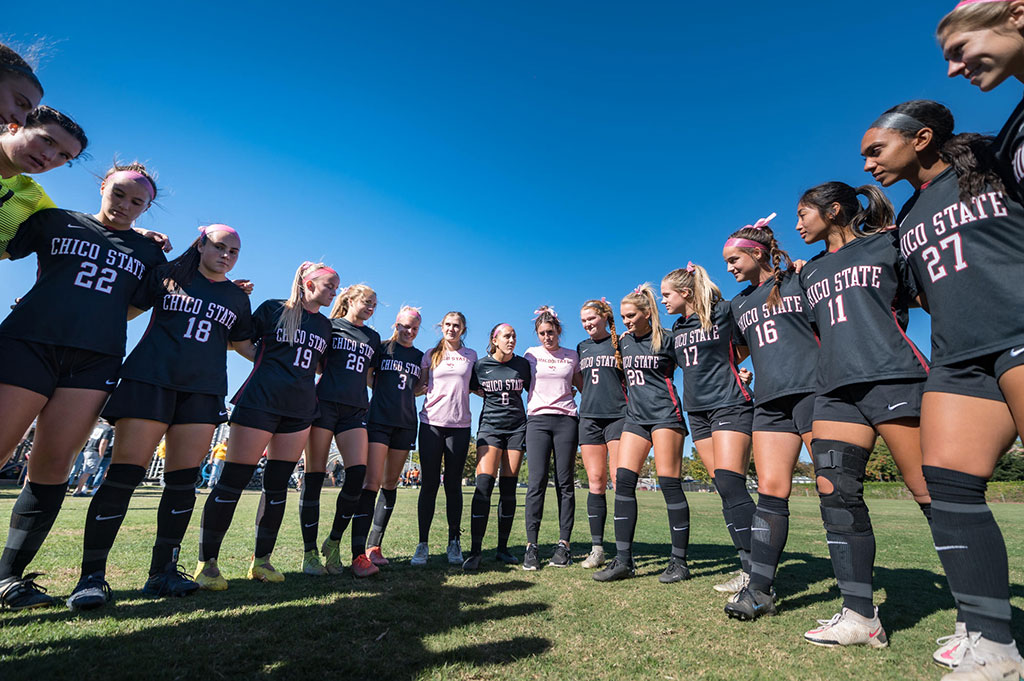Title IX at 50: Current Wildcat Calling Attention to Women Who Paved the Way

The 1972 passage of Title IX changed Chico State’s Department of Athletics dramatically. Perhaps no one knows this better than Mia Mendoza. The third-year media arts major spent two seasons in the women’s soccer program, but when a health scare caused her to hang up her cleats, she funneled her passion into an internship tackling a special project in the Athletics Department—working to educate all Wildcats and their fans on social media about the legacy of Title IX.
She’s learned a lot, but one epiphany was particularly powerful.
“Title IX is why I was able to come to Chico State and play college soccer, and also why I got the opportunity to do this internship,” Mendoza said. “The same opportunities for women just didn’t exist before Title IX.”

The year before the landmark legislation prohibiting sex discrimination in any federally funded education program or activity was passed, the women’s athletics budget at Chico State was less than one third of the men’s. Nationally, the NCAA did not hold championships for women’s sports and 85% of college student-athletes were men.
Today, the women’s share of the budget has risen to 50% and the Wildcats regularly compete for conference, regional, and national championships.
It’s been a long, bumpy journey to get here. Women played basketball at Chico State during the Normal School Days, but when faculty voted to end travel to games, the women responded by disbanding the team in what was later referred to as the Basketball Riot of 1903. Before the passage of Title IX, women were often treated as second-class citizens in athletics, relegated to intramurals or what were called “play days,” which encouraged participation over competitiveness.
“Amazing women leaders like Coach Sutton, (Executive Director of Athletics) Anita Barker, and even President (Gayle) Hutchinson have helped me see the value and importance of having women in positions of leadership. And learning about all of the women who fought for my rights to have the opportunity is inspiring.”
Mia Mendoza
Despite those barriers and budgetary challenges, strong female leaders created opportunities for women to play at Chico State that did not exist in many other places. They believed competition was healthy and productive, and instilled positive qualities in the women who participated. Through their efforts, Chico State women’s teams earned a strong reputation for their competitive exploits.
Mendoza has been stunned and inspired by all she’s learned. She is producing a social media post each Tuesday for the Chico State Athletics Facebook, Twitter, and Instagram feeds to highlight her discoveries and the inspiring women who helped create opportunities to compete.
Jane Shurmer, for whom Shurmer Gym is named, laid the foundation for the present-day intercollegiate program—initiating competitive field hockey, softball, badminton, archery, and swimming programs and recruiting women faculty with similar philosophies. In 1958, Shurmer was honored by the American Association of Health, Physical Education, and Recreation for “outstanding contributions to organizations involved in developing policies and standards governing women’s competitive sports.”
A one-time student of Shurmer, Betty Lou Raker became her protégé and built upon her philosophy beginning in 1958. As head of the department of physical education for women, Raker was instrumental in the further development of the Extramural League.

Influential coaches like Joan Wallace, who led the softball program for 29 years, also caught Mendoza’s attention.
Wallace’s teams posted 27 winning seasons and won the 1980 Association for Intercollegiate Athletics for Women Division III National Championship. Wallace worked to advance equity in women’s sports and in 1967 was elected chairperson of the Northern California Women’s Intercollegiate Council, formed to direct the growth of women’s athletics in the area. In 1992, the Women’s’ Sports Foundation honored Wallace with the Northern California National Girls and Women’s Sports Day Title IX Pioneer Award.
Mendoza’s coach, Kim Sutton, is the third winningest women’s coach in NCAA Division II soccer history. And her players had the highest GPA among all California public university women’s soccer programs in 2022–23.
“Amazing women leaders like Coach Sutton, (Executive Director of Athletics) Anita Barker, and even President (Gayle) Hutchinson have helped me see the value and importance of having women in positions of leadership,” Mendoza said. “And learning about all of the women who fought for my rights to have the opportunity is inspiring.”
Mendoza is now considering a career in collegiate athletics. According to Sutton, she’s already following in the footsteps of the trailblazers she’s spent the year revering by staying active in the soccer program as a student assistant coach while embracing several student-athlete leadership opportunities.
“She never scored a goal for us,” Sutton says. “But she’s brought more value to our program and our University than any goal ever could.”



